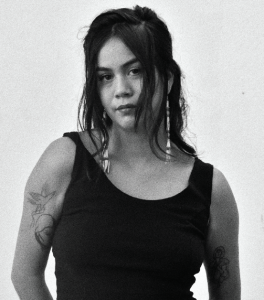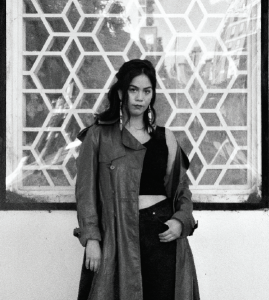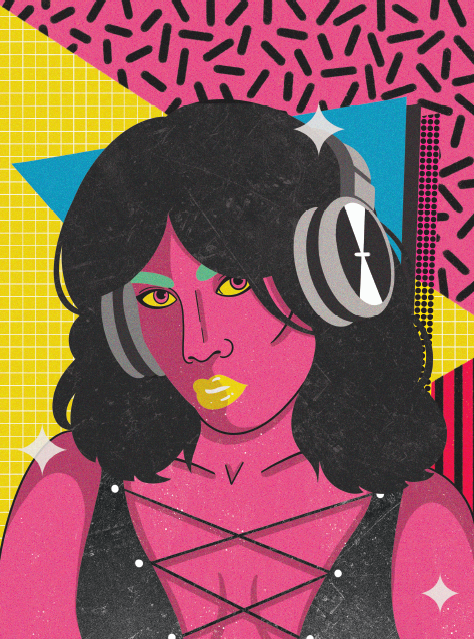Paisley Nahanee enters the café where we’ve chosen to meet, quickly spots my table at the back, and gives a friendly wave.
 She reaches me in a few quick strides and takes off her coat, draping it across the back of her chair in one beat. Happy conversation starts immediately, and after both ordering a cup of tea from the counter we exchange stories about not-for-profit work, the pains of Skype meetings, and the joys of juggling multiple projects at once. Nahanee is an expert at the latter, as the rising success of Dame Music Society, a collective of self-identifying women, trans and non-binary DJs, attests. She started Dame roughly two years ago, as a response to the exclusionary culture of Vancouver’s DJ scene at the time and to her own experiences as one of the few women of colour working with vinyl.
She reaches me in a few quick strides and takes off her coat, draping it across the back of her chair in one beat. Happy conversation starts immediately, and after both ordering a cup of tea from the counter we exchange stories about not-for-profit work, the pains of Skype meetings, and the joys of juggling multiple projects at once. Nahanee is an expert at the latter, as the rising success of Dame Music Society, a collective of self-identifying women, trans and non-binary DJs, attests. She started Dame roughly two years ago, as a response to the exclusionary culture of Vancouver’s DJ scene at the time and to her own experiences as one of the few women of colour working with vinyl.
“There wasn’t really a community at all, and it felt like all these older white dudes who were ‘vinyl heads’ and who had been doing it for so long, just wanted to see my career end or wanted to fuck me, or a weird combination of the two — [it was] just horrible,” Nahanee says. “But I loved [DJ’ing] so much, I just kept doing it and kept showing up to these gigs.” After one of said “vinyl heads” smashed her needles on the floor of the Fox’s Projection Room, Nahanee (as DJ Paisley Eva) was given a solo weekly slot to use however she pleased. She decided to turn it into an all-girl, all-vinyl night, training some friends to DJ alongside her and telling them to play whatever they wanted. Thus, Dame was born. There weren’t many places you could go to hear Blondie’s “Heart of Glass” play in the same set as Nigerian disco and classic post-punk, but Dame delivered.
Eventually a system of mentorship formed, with a small number of new DJ’s being brought on every few months and passing their skills on to the next group in turn. “It’s always been very hands-on, everyone’s helping each other,” Nahanee explains. “It grew pretty quickly, it outgrew the Projection Room, and so we started using Red Gate Arts Society and the Clubhouse; bigger venues and spaces. Now we’re two years in, we’ve trained probably around 40 women, queer and gender non-conforming folks how to DJ.”
In those two short years, the scene in Vancouver has palpably changed, and we largely have Dame to thank for much of that feeling. “It all goes back to the conversation around these white, male gatekeepers who had the scene for a really long time, and in the past few years we really saw the horrible, disgusting consequences that came out of them having power. They still have a lot of power, but it’s so important to [also] have these really small communities [that prioritize] diversity; of race, but also diversity in what you’re playing,” Nahanee says.
 Dame’s ethos of collectivity and support has roots in Nahanee’s identity as an Indigenous woman. “I’m from Squamish Nation — I grew up in Strathcona and I also grew up in my community on my reserve, and that culture is very different from North American culture,” she begins. “Everything is so shared, whether its your food or stories or your house, or skills.” Nahanee started getting involved in Vancouver’s music scene as a teenager, and immediately noticed the difference in community values. Knowledge was kept secret and safeguarded by a select few, which bred a culture of elitism and homogeneity. Nahanee’s presence in the scene was disruptive, simply because she prioritized collaboration. “When I got taught how to DJ I was like, I just got given this really cool opportunity, this really cool skill, why would I not share it? I was taught that every time you have a new skill you share it, with your community. And that comes from my Indigeneity.”
Dame’s ethos of collectivity and support has roots in Nahanee’s identity as an Indigenous woman. “I’m from Squamish Nation — I grew up in Strathcona and I also grew up in my community on my reserve, and that culture is very different from North American culture,” she begins. “Everything is so shared, whether its your food or stories or your house, or skills.” Nahanee started getting involved in Vancouver’s music scene as a teenager, and immediately noticed the difference in community values. Knowledge was kept secret and safeguarded by a select few, which bred a culture of elitism and homogeneity. Nahanee’s presence in the scene was disruptive, simply because she prioritized collaboration. “When I got taught how to DJ I was like, I just got given this really cool opportunity, this really cool skill, why would I not share it? I was taught that every time you have a new skill you share it, with your community. And that comes from my Indigeneity.”
In terms of Dame’s future, Nahanee hopes to secure a permanent home and build it into an artist-run centre of sorts, for DJs. Her tone rises in excitement as she describes plans for workshops, drop-in hours, and opportunities for shared studio time. In the face of constant venue closures and strict city by-laws, this kind of community-run, creative space sounds like a utopia. “They’re closing down DIY spaces … but they’re also the spaces that queer and BIPOC feel comfortable in,” Nahanee attests. She names the venue crisis as perhaps Dame’s biggest challenge. Regardless, the momentum of Dame as an inclusive movement, run by all who were previously excluded from Vancouver’s DJ scene, is decidedly hopeful.
“It’s this community and network of support, and I think that it’s just going to get bigger and bigger, and I think that even if Dame [ends], there’ll still be remnants of it — people training other people,” Nahanee explains. “It’s never felt like it’s just been my project. I just happened to start this thing, but then everybody made [Dame] what it is. In the beginning, when it felt like I was super isolated and alone and had no-one to really turn to, as an Indigenous woman, a woman of colour, in the DJ scene — I just don’t think that’s a thing anymore.”


